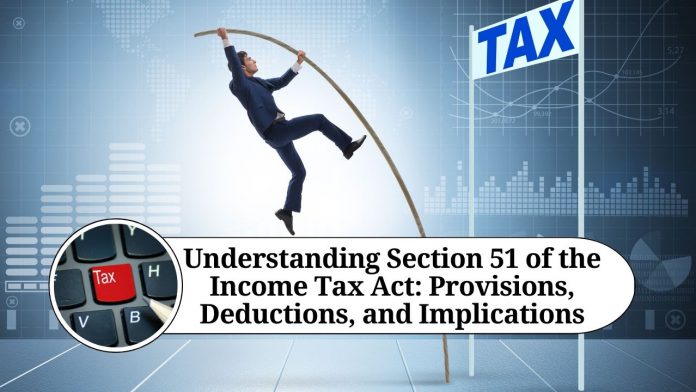Section 51 of the Income Tax Act: Understanding its Provisions and Implications
Income tax laws play a crucial role in the functioning of any modern economy. They provide the government with a source of revenue that can be used to fund various public services, infrastructure projects, and other essential initiatives. Section 51 of the Income Tax Act is an important provision that relates to the calculation of taxable income for taxpayers. In this blog, we will discuss the key provisions of Section 51 and its implications for taxpayers.
What is Section 51 of the Income Tax Act?
Section 51 of the Income Tax Act is a provision that deals with the calculation of taxable income for taxpayers. It specifies the deductions that are allowed from the gross total income of a taxpayer to arrive at the taxable income. The section lists various expenses that can be claimed as deductions, such as interest on loans, rent paid, depreciation of assets, and certain charitable donations.
Key Provisions of Section 51
The following are the key provisions of Section 51 of the Income Tax Act:
- Deductions Allowed for Business Expenses: The section allows taxpayers to claim deductions for expenses incurred in the course of their business or profession. These include rent paid for business premises, interest on loans taken for business purposes, depreciation of assets used for business, and other expenses related to the business.
- Deductions Allowed for Salary and Pension: Taxpayers can claim deductions for certain expenses related to their salary or pension income. These include standard deductions such as transport allowance, medical expenses, and professional tax, as well as deductions for contributions made to various pension schemes.
- Deductions Allowed for Charitable Donations: Section 51 also allows taxpayers to claim deductions for donations made to certain charitable institutions. The amount of deduction varies depending on the nature of the donation and the organization to which it is made.
- Limitations on Deductions: While Section 51 allows for several deductions, there are certain limitations on the amount that can be claimed. For example, there are limits on the amount of deduction that can be claimed for interest on loans taken for the purchase of a residential property, and deductions for charitable donations are subject to certain conditions.
Implications for Taxpayers
Understanding Section 51 of the Income Tax Act is important for taxpayers, as it can have significant implications for their taxable income and ultimately, their tax liability. By claiming deductions under this section, taxpayers can reduce their taxable income, and in turn, their tax liability. However, it is important to note that the deductions allowed under this section are subject to certain conditions and limitations, and taxpayers should consult a tax professional or refer to the relevant tax laws and guidelines before claiming any deductions.
Conclusion
Section 51 of the Income Tax Act is an important provision that specifies the deductions allowed from the gross total income of a taxpayer to arrive at the taxable income. The section allows for several deductions related to business expenses, salary and pension income, and charitable donations, among others. While claiming deductions under this section can reduce a taxpayer’s tax liability, it is important to comply with the relevant laws and guidelines and seek professional advice before making any claims.
Other Related Blogs: Section 144B Income Tax Act
Frequently Asked Questions (FAQs)
Q: What is the Income Tax Act? A: The Income Tax Act is a legislation that governs the taxation of income earned by individuals and organizations in a country. It lays out the rules and regulations that taxpayers must follow, and outlines the powers and responsibilities of tax authorities.
Q: What is Section 51 of the Income Tax Act? A: Section 51 of the Income Tax Act is a provision that deals with the calculation of taxable income for taxpayers. It specifies the deductions that are allowed from the gross total income of a taxpayer to arrive at the taxable income.
Q: What are some of the deductions allowed under Section 51? A: Some of the deductions allowed under Section 51 include expenses related to business or profession, standard deductions for salary or pension income, and certain charitable donations.
Q: Are there any limitations on the deductions allowed under Section 51? A: Yes, there are certain limitations on the deductions allowed under Section 51. For example, there are limits on the amount of deduction that can be claimed for interest on loans taken for the purchase of a residential property, and deductions for charitable donations are subject to certain conditions.
Q: How can claiming deductions under Section 51 reduce my tax liability? A: Claiming deductions under Section 51 can reduce your taxable income, and in turn, your tax liability. By deducting expenses related to your business or profession, or claiming standard deductions or charitable donations, you can reduce the amount of income that is subject to taxation.
Q: What should I do if I have questions about Section 51 or the Income Tax Act in general? A: If you have questions about Section 51 or the Income Tax Act in general, you should consult a tax professional or refer to the relevant tax laws and guidelines. They can provide you with advice and guidance on how to comply with the regulations and make the most of the deductions allowed under the law.




















